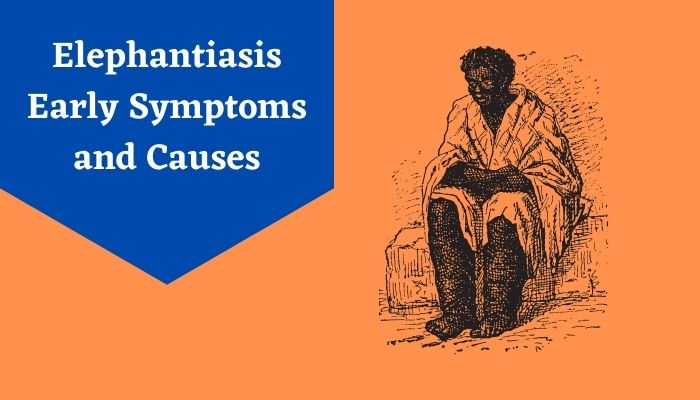Ankur works in the survey department of India and lives in Kolkata. Ankur visited an interior village in West Bengal for some official works. Once he returned, he experienced inflammation in his legs and arms. Initially, he thought it may be some normal inflammation and discomfort, so, he took some over-the-counter medications. After seeing his condition, one of his friends suggested that he should consult a doctor as he may suffer from elephantiasis symptoms.
So, what are elephantiasis, its symptoms, and treatment methods? Let’s unravel it.
What is Elephantiasis?
Elephantiasis or lymphatic filariasis is a rare condition that’s spread by mosquitoes. Though elephantiasis is an overlooked tropical disease (NTD), it is mostly found in tropical and subtropical areas, including Africa and Southeast Asia. More than 120 million people in the world are suffering from elephantiasis.Symptoms/Signs of Elephantiasis
Elephantiasis early symptoms are swelling of various body parts. The swelling can happen in the areas of- Legs
- Genitals
- Breasts
- Arms
Common Causes of Elephantiasis
Elephantiasis disease is caused by parasitic worms that are spread by mosquitoes. Three types of worms are there and they are:- Wuchereria Bancrofti
- Brugia Malayi
- Brugia Timori
This disease occurs when mosquitoes infected with the roundworm larvae bite you. The little larvae enter your bloodstream and thrive. They grow completely inside your lymph system. They can happily stay inside your system for years and create a plethora of damage to your lymph system. This may lead to swelling. Until you get swelling in your body parts, you may not predict whether you have elephantiasis or not.
Diagnosis of Elephantiasis
Your doctor will check your symptoms while doing a physical exam. Depending on the diagnosis, you may need to conduct some blood tests. Once your blood sample is taken, it is sent to a lab for examination to detect the presence of the parasites. Your doctor will conduct your X-rays and ultrasounds to rule out the possibility of other complications due to the symptoms.Treatment & Medications of Elephantiasis
Elephantiasis can be controlled by some medications. These medications mostly kill parasite’s microfilariae and some adult worms. If you are suffering from other co-infections with other diseases, you may experience some side effects due to the medications. So, different regions use different treatment combinations.- Albendazole is applicable in areas with Loiasis (or African eye worm)
- Ivermectin is primarily used with albendazole in areas with onchocerciasis (or river blindness). You need to take ivermectin once a year for long-term results.
- Diethylcarbamazine citrate (DEC) is also used with albendazole in areas without onchocerciasis. This medicine also you need to take once a year. This medication kills all microscopic worms in your bloodstream.
- In areas where onchocerciasis is not present, all three medications are recommended
- Several studies have also claimed that taking 200 milligrams a day of doxycycline can kill adult worms. But this treatment is not yet recommended by the World Health Organization.
Preventive Chemotherapy
To avert the spread of lymphatic filariasis/elephantiasis, combinations of medications are given to people in a particular area (irrespective of whether they have been diagnosed with the condition). Though this may not cure people who are suffering from lymphatic filariasis or its problems, it can prevent the disease to some extent. This efficiently extirpates the microfilariae that are carried by mosquitoes and spread from person to person.Vector Control
Since mosquitos are playing an imperative part in the transmission of this elephantiasis, hence we should try to extirpate their population as a prevention method. Mosquitos are also responsible for other diseases like dengue, malaria, etc.- Use mosquito nets whenever is possible
- Spray in and around residential areas
- Always wear full sleeves and long pants along with DEET (if available)
Other Methods
If you are suffering from elephantiasis, you can follow the below-mentioned steps to overcome the symptoms.- Wash and dry the swollen or affected areas regularly
- Use moisturizers
- Monitor the wounds and use medicated cream in the areas of sore spots
- Do some exercises like walking or yoga
- Whenever sitting or lying down, keep your arms and legs elevated if they are swollen
- Wrap the affected or wounded area firmly to prevent them from getting worse
Complications of Elephantiasis
The prime complication of elephantiasis is disability due to extreme swelling and enlarged body parts. You may not accomplish your daily task or work due to excruciating pain and swelling. Moreover, secondary infections are also a common problem for elephantiasis.Though elephantiasis is a less common disease these days, still, you may get infected with the parasite if you have been bitten by infected mosquitoes repeatedly. If you are visiting tropical and sub-tropical regions for a short term, then your chances of getting the infection are less, but if you are staying in these areas for a longer period, your chances of getting an infection will increase. Sometimes, you may feel worried or depressed due to how your condition looks to other people. To boost up your confidence or know information about the disease, you can talk to self-help groups or check online to find resources that might help you to overcome your condition.



